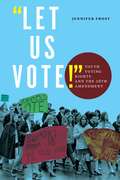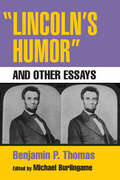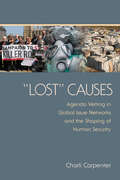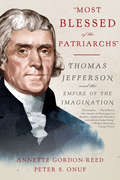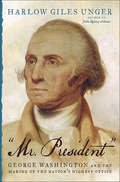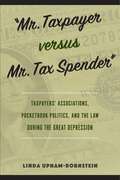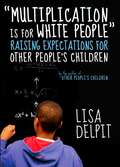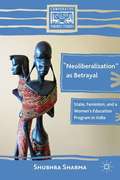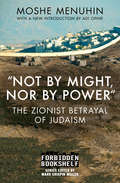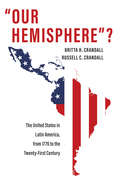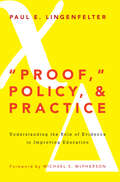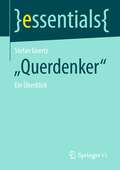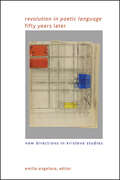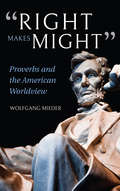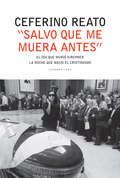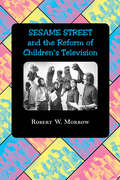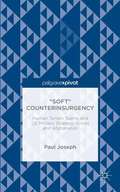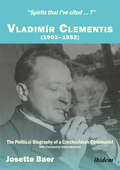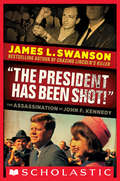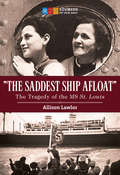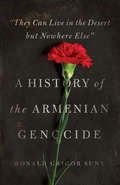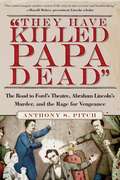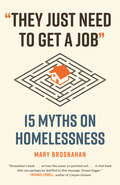- Table View
- List View
"Let Us Vote!": Youth Voting Rights and the 26th Amendment
by Jennifer FrostThe fascinating tale of how a bipartisan coalition worked successfully to lower the voting age“Let Us Vote!” tells the story of the multifaceted endeavor to achieve youth voting rights in the United States. Over a thirty-year period starting during World War II, Americans, old and young, Democrat and Republican, in politics and culture, built a movement for the 26th Amendment to the US Constitution, which lowered the voting age from twenty-one to eighteen in 1971. This was the last time that the United States significantly expanded voting rights.Jennifer Frost deftly illustrates how the political and social movements of the time brought together bipartisan groups to work tirelessly in pursuit of a lower voting age. In turn, she illuminates the process of achieving political change, with the convergence of “top-down” initiatives and “bottom-up” mobilization, coalition-building, and strategic flexibility. As she traces the progress toward achieving youth suffrage throughout the ’60s, Frost reveals how this movement built upon the social justice initiatives of the decade and was deeply indebted to the fight for African American civil and voting rights.2021 marks the fiftieth anniversary of this important constitutional amendment and comes at a time when scrutiny of both voting age and voting rights has been renewed. As the national conversation around climate crisis, gun violence, and police brutality creates a new call for a lower voting age, “Let Us Vote!” provides an essential investigation of how this massive political change occurred, and how it could be brought about again.
"Lincoln's Humor" and Other Essays
by Benjamin P. ThomasThis volume gathers the best previously unpublished and uncollected writings on Abraham Lincoln and Lincoln scholarship by one of his great biographers, Benjamin P. Thomas. A skilled historian and a masterful storyteller himself, Thomas was widely regarded as the greatest Lincoln historian of his generation. With these essays, he combines historical depth with narrative grace in delineating Lincoln's qualities as a humorist, lawyer, and politician. From colorful tall tales to clever barbs aimed at political opponents, Lincoln clothed a shrewd wit in a homespun, backwoods vernacular. He used humor to defuse tension, illuminate a point, put others at ease--and sometimes for sheer fun. From an early reliance on broad humor and ridicule in speeches and on the stump, Lincoln's style shifted in 1854 to a more serious vein in which humor came primarily to elucidate an argument. "If I did not laugh occasionally I should die," he is said to have told his cabinet, "and you need this medicine as much as I do." Thomas brings his deep knowledge of Lincoln to essays on the great man's tumultuous career in Congress, his work as a lawyer, his experiences in the Courts, and his opinions of the South. A gracious survey of Lincoln's early biographers, particularly Ida Tarbell, stands alongside an appreciation of Harry Edward Pratt, a key figure in the early days of the Abraham Lincoln Association. Thomas also assesses Lincoln's use of language and the ongoing significance of the Gettysburg Address. This diverse collection is enhanced by an introduction by Michael Burlingame, himself a leading biographer of Lincoln. Burlingame provides a balanced portrait of Thomas and his circuitous path toward writing history.
"Lost" Causes: Agenda Vetting in Global Issue Networks and the Shaping of Human Security
by Charli CarpenterWhy do some issues and threats—diseases, weapons, human rights abuses, vulnerable populations—get more global policy attention than others? How do global activist networks decide the particular causes for which they advocate among the many problems in need of solutions? According to Charli Carpenter, the answer lies in the politics of global issue networks themselves. Building on surveys, focus groups, and analyses of issue network websites, Carpenter concludes that network access has a direct relation to influence over how issues are ranked. Advocacy elites in nongovernmental and transnational organizations judge candidate issues not just on their merit but on how the issues connect to specific organizations, individuals, and even other issues.In "Lost" Causes, Carpenter uses three case studies of emerging campaigns to show these dynamics at work: banning infant male circumcision; compensating the wartime killing and maiming of civilians; and prohibiting the deployment of fully autonomous weapons (so-called killer robots). The fate of each of these campaigns was determined not just by the persistence and hard work of entrepreneurs but by advocacy elites' perception of the issues' network ties. Combining sweeping analytical argument with compelling narrative, Carpenter reveals how the global human security agenda is determined.
"Monetary and Fiscal Rules in an Emerging Small Open Economy"
by Paul Levine Nicoletta Batini Joseph PearlmanA report from the International Monetary Fund.
"Most Blessed of the Patriarchs": Thomas Jefferson and the Empire of the Imagination
by Annette Gordon-Reed Peter S. OnufA groundbreaking work of history that explicates Thomas Jefferson's vision of himself, the American Revolution, Christianity, slavery, and race. Thomas Jefferson is often portrayed as a hopelessly enigmatic figure--a riddle--a man so riven with contradictions that he is almost impossible to know. Lauded as the most articulate voice of American freedom and equality, even as he held people--including his own family--in bondage, Jefferson is variably described as a hypocrite, an atheist, or a simple-minded proponent of limited government who expected all Americans to be farmers forever. Now, Annette Gordon-Reed teams up with America's leading Jefferson scholar, Peter S. Onuf, to present an absorbing and revealing character study that dispels the many clichés that have accrued over the years about our third president. Challenging the widely prevalent belief that Jefferson remains so opaque as to be unknowable, the authors--through their careful analysis, painstaking research, and vivid prose--create a portrait of Jefferson, as he might have painted himself, one "comprised of equal parts sun and shadow" (Jane Kamensky). Tracing Jefferson's philosophical development from youth to old age, the authors explore what they call the "empire" of Jefferson's imagination--an expansive state of mind born of his origins in a slave society, his intellectual influences, and the vaulting ambition that propelled him into public life as a modern avatar of the Enlightenment who, at the same time, likened himself to a figure of old--"the most blessed of the patriarchs." Indeed, Jefferson saw himself as a "patriarch," not just to his country and mountain-like home at Monticello but also to his family, the white half that he loved so publicly, as well as to the black side that he claimed to love, a contradiction of extraordinary historical magnitude. Divided into three sections, "Most Blessed of the Patriarchs" reveals a striking personal dimension to his life. Part I, "Patriarch," explores Jeffersons's origins in Virgina; Part II, " 'Traveller,' " covers his five-year sojourn to Paris; and Part III, "Enthusiast," delves insightfully into the Virginian's views on Christianity, slavery, and race. We see not just his ideas and vision of America but come to know him in an almost familial way, such as through the importance of music in his life. "Most Blessed of the Patriarchs" fundamentally challenges much of what we've come to accept about Jefferson, neither hypocrite nor saint, atheist nor fundamentalist. Gordon-Reed and Onuf, through a close reading of Jefferson's own words, reintroduce us all to our most influential founding father: a man more gifted than most, but complicated in just the ways we all are.
"Mr. President": George Washington and the Making of the Nation's Highest Office
by Harlow Giles UngerAlthough the framers gave the president little authority, George Washington knew whatever he did would set precedents for generations of future leaders. To ensure their ability to defend the nation, he simply ignored the Constitution when he thought it necessary. In a revealing new look at the birth of American government, #147;Mr. President” describes Washington’s presidency in a time of continual crisis, as rebellion and attacks by foreign enemies threatened to destroy this new nation. Constantly weighing preservation of the Union against preservation of individual liberties and states’ rights, Washington assumed more power with each crisis. In a series of brilliant but unconstitutional maneuvers he forced Congress to cede control of the four pillars of executive power: war, finance, foreign affairs, and law enforcement. Drawing on rare documents and letters, Unger shows how Washington combined political cunning and sheer genius to seize ever-widening powers, impose law and order while ensuring individual freedom, and shape the office of President of the United States.
"Mr. Taxpayer versus Mr. Tax Spender": Taxpayers' Associations, Pocketbook Politics, and the Law during the Great Depression
by Linda Upham-BornsteinDuring the Great Depression, the proliferation of local taxpayers’ associations was dramatic and unprecedented. The justly concerned members of these organizations examined the operations of state, city, and county governments, then pressed local officials for operational and fiscal reforms. These associations aimed to reduce the cost of state and local governments to make operations more efficient and less expensive. “Mr. Taxpayer versus Mr. Tax Spender” presents a comprehensive overview of these grassroots taxpayers’ leagues beginning in the 1860s and shows how they evolved during their heyday in the 1930s. Linda Upham-Bornstein chronicles the ways these taxpayers associations organized as well as the tools they used—constructive economy, political efforts, tax strikes, and tax revolt through litigation—to achieve their objectives. Taxpayer activity was a direct consequence of—and a response to—the economic crisis of the Great Depression and the expansion of the size and scope of government. “Mr. Taxpayer versus Mr. Tax Spender” connects collective tax resistance in the 1930s to the populist tradition in American politics and to other broad impulses in American political and legal history.
"Multiplication Is for White People"
by Lisa DelpitAs MacArthur award-winning educator Lisa Delpit reminds us-and as all research shows-there is no achievement gap at birth. In her long-awaited second book, Delpit presents a striking picture of the elements of contemporary public education that conspire against the prospects for poor children of color, creating a persistent gap in achievement during the school years that has eluded several decades of reform.Delpit's bestselling and paradigm-shifting first book, Other People's Children, focused on cultural slippage in the classroom between white teachers and students of color. Now, in "Multiplication is for White People", Delpit reflects on two decades of reform efforts-including No Child Left Behind, standardized testing, the creation of alternative teacher certification paths, and the charter school movement-that have still left a generation of poor children of color feeling that higher educational achievement isn't for them.In chapters covering primary, middle, and high school, as well as college, Delpit concludes that it's not that difficult to explain the persistence of the achievement gap. In her wonderful trademark style, punctuated with telling classroom anecdotes and informed by time spent at dozens of schools across the country, Delpit outlines an inspiring and uplifting blueprint for raising expectations for other people's children, based on the simple premise that multiplication-and every aspect of advanced education-is for everyone.
"Neoliberalization" as Betrayal: State, Feminism, and a Women’s Education Program in India (Comparative Feminist Studies)
by Shubhra SharmaThis book is concerned with the three-way relationship between neoliberalism, women's education, and the spatialization of the state, and analyses this through an ethnography lens of women's education programs in India.
"Not by Might, Nor by Power": The Zionist Betrayal of Judaism (Forbidden Bookshelf #22)
by Moshe MenuhinWith a new introduction by Adi Ophir: An early and fierce critique of Zionism from a Jewish child of Palestine who argued against nationalism and injustice. Born in 1893, Moshe Menuhin was part of the inaugural class to attend the first Zionist high school in Palestine, the Herzliya gymnasium in Tel Aviv. He had grown up in a Hasidic home, but eventually rejected orthodoxy while remaining dedicated to Judaism. As a witness to the evolution of Israel, Menuhin grew disaffected with what he saw as a betrayal of the Jews&’ spiritual principles. This memoir, written in 1965, is considered the first revisionist history of Zionism. A groundbreaking document, it discusses the treatment of the Palestinians, the effects of the Holocaust, the exploitation of the Mizrahi Jewish immigrants, and the use of propaganda to win over public opinion in America and among American Jews. In a postscript added after the Six-Day War, Menuhin also addresses the question of occupation. This new edition is updated with an introduction by Israeli philosopher Adi Ophir, putting Menuhin&’s work into a contemporary historical context. Passionate and sometimes inflammatory in its prose, and met with controversy and anger upon its original publication under the title The Decadence of Judaism in Our Time, Menuhin&’s polemic remains both a thought-provoking reassessment of Zionist history and a fascinating look at one observer&’s experience of this embattled corner of the world over the course of several tumultuous decades.
"Our Hemisphere"?: The United States in Latin America, from 1776 to the Twenty-First Century
by Russell C. Crandall Britta H. CrandallAn accessible exploration of U.S.–Latin American relations. from the colonial period to the present day &“&‘Our Hemisphere&’? is a balanced and nuanced portrayal of the history of U.S.–Latin American relations. The attention given to more recent episodes on immigration, the drug war and U.S. policy toward Cuba and Venezuela, is especially welcome.&”—Allen Wells, author of Tropical Zion: General Trujillo, FDR and the Jews of Sosúa &“Our Hemisphere&”? uncovers the range, depth, and veracity of the United States&’ relationship with the Americas. Using short historical vignettes, Britta and Russell Crandall chart the course of inter‑American relations from 1776 to the present, highlighting the roles that individuals and groups of soldiers, intellectuals, private citizens, and politicians have had in shaping U.S. policy toward Latin America in the postcolonial, Cold War, and post–Cold War eras. The United States is usually and correctly seen as pursuing a monolithic, hegemonic agenda in Latin America, wielding political, economic, and military muscle to force Latin American countries to do its bidding, but the Crandalls reveal unexpected yet salient regional interactions where Latin Americans have exercised their own power with their northern and very powerful neighbor. Moreover, they show that Washington&’s relationship with the region has relied, in addition to the usual heavy‑handedness, on cooperation and mutual respect since the beginning of the relationship.
"Proof," Policy, and Practice: Understanding the Role of Evidence in Improving Education
by Paul E. LingenfelterHow can we “fix” our schools? Improve graduation rates in college? What works?These are questions that make the headlines and vex policy makers, practitioners, and educational researchers. While they strive to improve society, there are frequently gulfs of mutual incomprehension among them.Academics, longing for more influence, may wrongly fault irrationality, ideology, or ignorance for the failure of research to inform policy and practice more powerfully. Policy makers and practitioners may doubt that academics can deliver ideas that will reliably yield desirable results. This book bridges the divide. It argues that unrealistic expectations lead to both unproductive research and impossible standards for “evidence-based” policy and practice, and it offers promising ways for evidence to contribute to improvement. It analyzes the utility and limitations of the different research methods that have been applied to policy and practice, as well as the strengths and weaknesses of educational reform strategies. It explains why using evidence for “accountability” often makes things worse rather than better.Paul Lingenfelter offers educational researchers and policy makers a framework for considering such questions as: What problems are important and accessible? What methods will be fruitful? Which help policy makers and practitioners make choices and learn how to improve? What information is relevant? What knowledge is valid and useful? How can policy makers and practitioners establish a more productive division of labor based on their respective capabilities and limitations? He cautions against the illusion that straight-forward scientific approaches and data can be successfully applied to society’s most complex problems. While explaining why no single policy or intervention can solve complex problems, he concludes that determination, measurement, analysis, and adaptation based on evidence in specific situations can lead to significant improvement. This positive, even-handed introduction to the use of research for problem-solving concludes by suggesting emerging practices and approaches that can help scholars, practitioners, and policy leaders become more successful in reaching their fundamental goals.
"Querdenker": Ein Überblick (essentials)
by Stefan GoertzEinführend werden die Ideologieelemente der „Querdenker“ besprochen, dort auch die Ergebnisse der ersten empirischen Studien zu „Querdenkern“ und Teilnehmern an Corona-Demonstrationen. Verschwörungserzählungen sind ein (potenzieller) Radikalisierungsfaktor und spielen für die Bewegung der „Querdenker“ eine wichtige Rolle. So werden verschiedene aktuelle internationale Verschwörungserzählungen von „Querdenkern“ aufgegriffen, darunter auch die antisemitische Verschwörungserzählung „QAnon“. In Reaktion auf die „Querdenker“-Bewegung haben die deutschen Verfassungsschutzbehörden einen neuen Phänomenbereich von Extremismus festgestellt, die „verfassungsschutzrelevante Delegitimierung des Staates“. Bei der Analyse der Szene der „Querdenker“ muss differenziert werden, weil eine komplexe Mischung aus Radikalismus, Verschwörungserzählungen und Extremismus festzustellen ist.
"Revolution in Poetic Language" Fifty Years Later: New Directions in Kristeva Studies (SUNY series in Gender Theory)
by Emilia AngelovaIn her 1974 Revolution in Poetic Language, Julia Kristeva resisted the abstract use of language, with its aim of totalization and finality, in all its colonizing and alienating forms. A major thinker and critic, Kristeva reappropriated Hegel's concepts of desire and negativity, in conjunction with the thought of Heidegger, Arendt, Freud, and Lacan, to revolt against modernity's culture of nihilism and the West's inability to deal with loss. This collection celebrates the fiftieth anniversary of Revolution in Poetic Language by revisiting Kristeva's oeuvre and establishing exciting new directions in Kristeva studies. Engaging with queer and transgender studies, disability studies, decolonial studies, and more, renowned and rising scholars plot continuities in—and push the boundaries of—Kristeva's thinking about loss, revolution, and revolt. The volume also includes two essays by Kristeva, translated into English for the first time here—"The Impossibility of Loss" (1988) and "Of What Use Are Poets in Times of Distress?" (2016).
"Right Makes Might": Proverbs and the American Worldview
by Wolfgang Mieder“A powerful and timely addition to the literature of rhetoric and folklore.” —ChoiceIn 1860, Abraham Lincoln employed the proverb Right makes might—opposite of the more aggressive Might makes right—in his famed Cooper Union address. While Lincoln did not originate the proverb, his use of it in this critical speech indicates that the fourteenth century phrase had taken on new ethical and democratic connotations in the nineteenth century. In this collection, famed scholar of proverbs Wolfgang Mieder explores the multifaceted use and function of proverbs through the history of the United States, from their early beginnings up through their use by such modern-day politicians as Barack Obama, Hillary Rodham Clinton, and Bernie Sanders. Building on previous publications and unpublished research, Mieder explores sociopolitical aspects of the American worldview as expressed through the use of proverbs in politics, women’s rights, and the civil rights movement—and by looking at the use of proverbial phrases, Mieder demonstrates how one traditional phrase can take on numerous expressive roles over time, and how they continue to play a key role in our contemporary moment.
"Right Makes Might": Proverbs and the American Worldview
by Wolfgang Mieder“A powerful and timely addition to the literature of rhetoric and folklore.” —ChoiceIn 1860, Abraham Lincoln employed the proverb Right makes might—opposite of the more aggressive Might makes right—in his famed Cooper Union address. While Lincoln did not originate the proverb, his use of it in this critical speech indicates that the fourteenth century phrase had taken on new ethical and democratic connotations in the nineteenth century. In this collection, famed scholar of proverbs Wolfgang Mieder explores the multifaceted use and function of proverbs through the history of the United States, from their early beginnings up through their use by such modern-day politicians as Barack Obama, Hillary Rodham Clinton, and Bernie Sanders. Building on previous publications and unpublished research, Mieder explores sociopolitical aspects of the American worldview as expressed through the use of proverbs in politics, women’s rights, and the civil rights movement—and by looking at the use of proverbial phrases, Mieder demonstrates how one traditional phrase can take on numerous expressive roles over time, and how they continue to play a key role in our contemporary moment.
"Salvo que me muera antes": El día en que murió Kirchner. La noche que nació el cristinismo
by Ceferino Reato«Muchachos, el próximo presidente voy a ser yo salvo que me muera antes.» Néstor Kirchner a un grupo de dirigentes oficialistas y encuestadores. Residencia de Olivos, dos semanas antes de su muerte. A siete años de aquel miércoles 27 de octubre de 2010, la Argentina sigue sin saber con certeza dónde, a qué hora y de qué murió Néstor Kirchner; tampoco, si se podría haber salvado. Con un estilo que ya es marca -información original y precisa en una narración atrapante-, Ceferino Reato cuenta qué pasó exactamente ese día en El Calafate, explica cómo se reconfiguró el poder político en el país a partir de esa noche y da respuesta a las preguntas pendientes: *¿Cómo se llevaban realmente, puertas adentro, Néstor y Cristina? *¿Cuánto sabía ella del esquema de corrupción organizado por él? *¿Qué pasó en la despedida íntima antes del traslado del cuerpo a Buenos Aires? *¿Por qué el velatorio público se hizo a cajón cerrado? Por primera vez, la trama completa de la tragedia que dio origen al poderoso liderazgo de Cristina Fernández.
"Sesame Street" and the Reform of Children's Television
by Robert W. MorrowOutstanding Academic Title for 2007, Choice MagazineBy the late 1960s more than a few critics of American culture groused about the condition of television programming and, in particular, the quality and content of television shows for children. In the eyes of the reform-minded, commercial television crassly exploited young viewers; its violence and tastelessness served no higher purpose than the bottom line. The Children's Television Workshop (CTW)—and its fresh approach to writing and producing programs for kids—emerged from this growing concern. Sesame Street—CTW's flagship, hour-long show—aimed to demonstrate how television could help all preschoolers, including low-income urban children, prepare for first grade. In this engaging study Robert W. Morrow explores the origins and inner workings of CTW, how the workshop in New York scripted and designed Sesame Street, and how the show became both a model for network television as well as a thorn in its side. Through extensive archival research and a systematic study of sample programs from Sesame Street's first ten seasons, Morrow tells the story of Sesame Street's creation; the ideas, techniques, organization, and funding behind it; its place in public discourse; and its ultimate and unfortunate failure as an agent of commercial television reform.
"Soft" Counterinsurgency: Human Terrain Teams and US Military Strategy in Iraq and Afghanistan
by Paul JosephSoft Counterinsurgency reviews the promises and achievements of Human Terrain Teams, the small groups of social scientists that were eventually embedded in every combat brigade in Iraq and Afghanistan.
"Spirits that I've cited...?" Vladimír Clementis (1902–1952): The Political Biography of a Czechoslovak Communist
by Josette BaerBaer's biography of the former Czechoslovak foreign minister Vladimír Clementis (1902–1952) is the first historical study on the Communist politician who was executed with Rudolf Slánský and other top Communist Party members after the show trial of 1952. Born in Tisovec, Central Slovakia, Clementis studied law at Charles University in Prague in the 1920s and had his own law firm in Bratislava in the 1930s. After the Munich Agreement of 1938, he went into exile to France and Great Britain, where he worked at the Czechoslovak broadcast at the BBC for the exile government of Edvard Beneš. After the Second World War, Clementis' political career at the Czechoslovak Foreign Ministry blossomed. In 1945, he became Assistant Secretary of State under Foreign Minister Jan Masaryk. After Masaryk's mysterious death in 1948, Clementis was appointed foreign minister. This biography offers an unprecedented insight into the mind of a Slovak leftist intellectual of the interwar generation who died at the command of the comrade he had admired since his youth: Generalissimus Stalin.
"The President Has Been Shot!": The Assassination Of John F. Kennedy
by James L. SwansonA breathtaking and dramatic account of the JFK assassination by the NEW YORK TIMES bestselling author of CHASING LINCOLN'S KILLER!In his new young-adult book on the Kennedy assassination, James Swanson will transport readers back to one of the most shocking, sad, and terrifying events in American history. As he did in his bestselling Scholastic YA book, CHASING LINCOLN'S KILLER, Swanson will deploy his signature "you are there" style -- a riveting, ticking-clock pace, with an unprecedented eye for dramatic details and impeccable historical accuracy -- to tell the story of the JFK assassination as it has never been told before.The book will be illustrated with archival photos, and will have diagrams, source notes, bibliography, places to visit, and an index.
"The Saddest Ship Afloat": The Tragedy of the MS St. Louis (Stories of Our Past)
by Allison LawlorA true story of hundreds of Jewish refugees and the sea journey they hoped would save them. On May 13, 1939, the eve of the Second World War, the MS St. Louis left port in Hamburg, Germany, headed for Havana, Cuba. Among the ship’s passengers were more than six hundred Jews attempting to escape Nazi rule. But most of the visas the passengers had purchased turned out to be fake, and after several days in limbo in Havana’s harbor, the ship’s captain turned back for Europe. Canadian and American activists petitioned their governments to accept the refugees on humanitarian grounds, but to no avail. On its return, the ship would distribute its passengers among European countries, and over the course of the war, an estimated 250 would die in Nazi concentration camps.This volume in the Stories of our Past series is illustrated with photos and sidebar features on the voyage, glimpses into the lives of passengers, a look at Canada’s postwar refugee policy, and memorials dedicated to preserving the story of this tragic event in Canadian immigration history.
"They Can Live in the Desert but Nowhere Else": A History of the Armenian Genocide
by Ronald Grigor SunyStarting in early 1915, the Ottoman Turks began deporting and killing hundreds of thousands of Armenians in the first major genocide of the twentieth century. By the end of the First World War, the number of Armenians in what would become Turkey had been reduced by ninety percent--more than a million people. A century later, the Armenian Genocide remains controversial but relatively unknown, overshadowed by later slaughters and the chasm separating Turkish and Armenian versions of events. In this definitive narrative history, Ronald Suny cuts through nationalist myths, propaganda, and denial to provide an unmatched account of when, how, and why the atrocities of 1915-16 were committed.As it lost territory during the war, the Ottoman Empire was becoming a more homogenous Turkic-Muslim state, but it still contained large non-Muslim communities, including the Christian Armenians. The Young Turk leaders of the empire believed that the Armenians were internal enemies secretly allied to Russia and plotting to win an independent state. Suny shows that the great majority of Armenians were in truth loyal subjects who wanted to remain in the empire. But the Young Turks, steeped in imperial anxiety and anti-Armenian bias, became convinced that the survival of the state depended on the elimination of the Armenians. Suny is the first to explore the psychological factors as well as the international and domestic events that helped lead to genocide.Drawing on archival documents and eyewitness accounts, this is an unforgettable chronicle of a cataclysm that set a tragic pattern for a century of genocide and crimes against humanity.
"They Have Killed Papa Dead!": The Road to Ford's Theatre, Abraham Lincoln's Murder, and the Rage for Vengeance
by Anthony S. PitchThe assassination of Abraham Lincoln is a central drama of the American experience. Its impact is felt to this day, and the basic story is known to all. Anthony Pitch's thrilling account of the Lincoln conspiracy and its aftermath transcends the mere facts of that awful night during which dashing actor John Wilkes Booth shot Lincoln in the head and would-be assassin Lewis Payne butchered Secretary of State William Seward in the bed of his own home. <p><p> "They Have Killed Papa Dead!" transports the reader to one of the most breathtaking moments in history, and reveals much about the stories, passions, and times of those who shaped this great tragedy. Virtually every word of Anthony Pitch's account is based on primary source material: quotes from previously unpublished documents, diaries, letters, and journals. With an unwavering fidelity to historical accuracy, Pitch provides confirmation of threats against the president-elect's life as he traveled to Washington by train for his first inauguration, and a vivid personal account of John Wilkes Booth being physically restrained from approaching Lincoln at his second inauguration. <p> Perhaps most chillingly, details come to light about conditions in the special prison where the civilian conspirators accused of participating in the Lincoln assassination endured tortuous conditions in extreme isolation and deprivation, hooded and shackled, before and even during their military trial. Pitch masterfully synthesizes the findings of his prodigious research into a tight, gripping narrative that adds important insights to our national story.
"They Just Need to Get a Job": 15 Myths on Homelessness (Myths Made in America #10)
by Mary Brosnahan&“Readers will come away infuriated, with a greater understanding of the systemic causes of homelessness, and with more compassion for their homeless neighbors. Essential reading for any community affected by homelessness (which is all of them).&” —Booklist, Starred ReviewFor readers of Andrea Elliott and Matthew Desmond, the former CEO of the Coalition for the Homeless breaks through the highly destructive misinformation surrounding our homeless neighborsConservative think tanks like the Manhattan Institute disseminate anti-homeless myths in the media, legislatures, and the larger culture, claiming that our homeless neighbors cause their own predicament and that the best we can do is manage the problem.Drawing on her deep legal knowledge, policy expertise, and decades of frontline service, Mary Brosnahan cuts through the misinformation to deliver two important messages: that homelessness ultimately stems from a lack of investment in affordable housing; and that the greatest myth of all is that we should have no hope. In fact, the proven solutions are well documented, and the ability to enact them depends on us all.Brosnahan takes a nationwide look from New York to Detroit, Philly to L.A., and from rural areas such as Cumberland County, Pennsylvania to debunk 15 widespread misconceptions, including:that the problem is inevitable (in fact, Housing First approaches have shown great success)that &“handouts&” cause homelessness (in fact, the primary causes are flat wages and high rent)that homeless people need to prove that they&’re &“ready&” to receive aid (in fact, enforcing hurdles is far more expensive and less effective than Housing First).With brilliant insight, Brosnahan showcases how by dispelling these pervasive myths rooted in fear, we can embrace the affordable, housing-based solutions that will bring our impoverished neighbors home.
